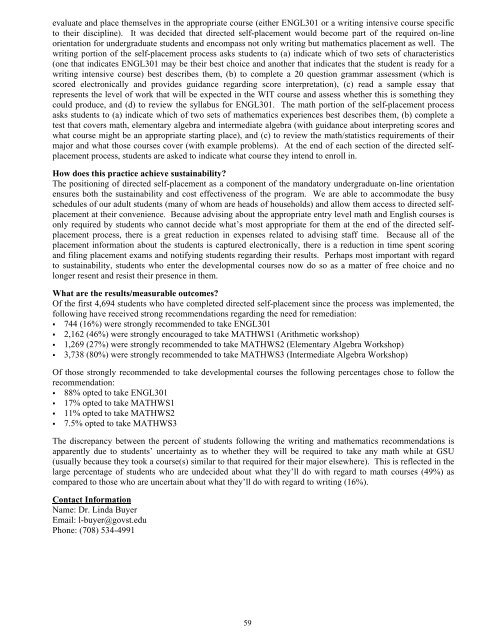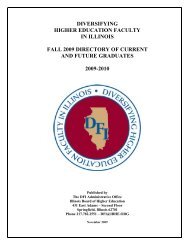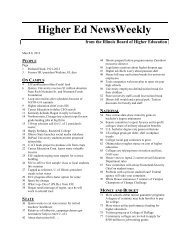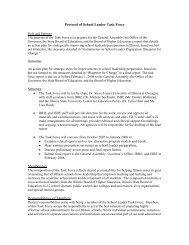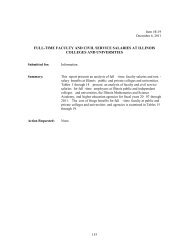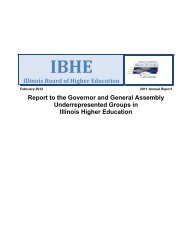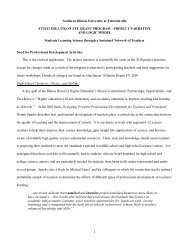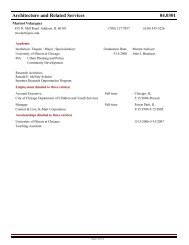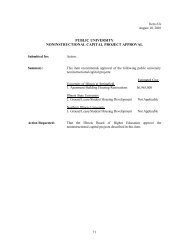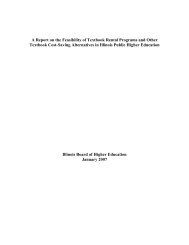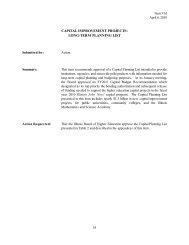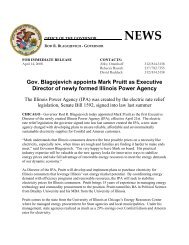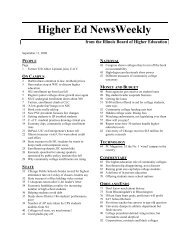Title of Effective Practice: - California Postsecondary Education ...
Title of Effective Practice: - California Postsecondary Education ...
Title of Effective Practice: - California Postsecondary Education ...
Create successful ePaper yourself
Turn your PDF publications into a flip-book with our unique Google optimized e-Paper software.
evaluate and place themselves in the appropriate course (either ENGL301 or a writing intensive course specific<br />
to their discipline). It was decided that directed self-placement would become part <strong>of</strong> the required on-line<br />
orientation for undergraduate students and encompass not only writing but mathematics placement as well. The<br />
writing portion <strong>of</strong> the self-placement process asks students to (a) indicate which <strong>of</strong> two sets <strong>of</strong> characteristics<br />
(one that indicates ENGL301 may be their best choice and another that indicates that the student is ready for a<br />
writing intensive course) best describes them, (b) to complete a 20 question grammar assessment (which is<br />
scored electronically and provides guidance regarding score interpretation), (c) read a sample essay that<br />
represents the level <strong>of</strong> work that will be expected in the WIT course and assess whether this is something they<br />
could produce, and (d) to review the syllabus for ENGL301. The math portion <strong>of</strong> the self-placement process<br />
asks students to (a) indicate which <strong>of</strong> two sets <strong>of</strong> mathematics experiences best describes them, (b) complete a<br />
test that covers math, elementary algebra and intermediate algebra (with guidance about interpreting scores and<br />
what course might be an appropriate starting place), and (c) to review the math/statistics requirements <strong>of</strong> their<br />
major and what those courses cover (with example problems). At the end <strong>of</strong> each section <strong>of</strong> the directed selfplacement<br />
process, students are asked to indicate what course they intend to enroll in.<br />
How does this practice achieve sustainability?<br />
The positioning <strong>of</strong> directed self-placement as a component <strong>of</strong> the mandatory undergraduate on-line orientation<br />
ensures both the sustainability and cost effectiveness <strong>of</strong> the program. We are able to accommodate the busy<br />
schedules <strong>of</strong> our adult students (many <strong>of</strong> whom are heads <strong>of</strong> households) and allow them access to directed selfplacement<br />
at their convenience. Because advising about the appropriate entry level math and English courses is<br />
only required by students who cannot decide what’s most appropriate for them at the end <strong>of</strong> the directed selfplacement<br />
process, there is a great reduction in expenses related to advising staff time. Because all <strong>of</strong> the<br />
placement information about the students is captured electronically, there is a reduction in time spent scoring<br />
and filing placement exams and notifying students regarding their results. Perhaps most important with regard<br />
to sustainability, students who enter the developmental courses now do so as a matter <strong>of</strong> free choice and no<br />
longer resent and resist their presence in them.<br />
What are the results/measurable outcomes?<br />
Of the first 4,694 students who have completed directed self-placement since the process was implemented, the<br />
following have received strong recommendations regarding the need for remediation:<br />
• 744 (16%) were strongly recommended to take ENGL301<br />
• 2,162 (46%) were strongly encouraged to take MATHWS1 (Arithmetic workshop)<br />
• 1,269 (27%) were strongly recommended to take MATHWS2 (Elementary Algebra Workshop)<br />
• 3,738 (80%) were strongly recommended to take MATHWS3 (Intermediate Algebra Workshop)<br />
Of those strongly recommended to take developmental courses the following percentages chose to follow the<br />
recommendation:<br />
• 88% opted to take ENGL301<br />
• 17% opted to take MATHWS1<br />
• 11% opted to take MATHWS2<br />
• 7.5% opted to take MATHWS3<br />
The discrepancy between the percent <strong>of</strong> students following the writing and mathematics recommendations is<br />
apparently due to students’ uncertainty as to whether they will be required to take any math while at GSU<br />
(usually because they took a course(s) similar to that required for their major elsewhere). This is reflected in the<br />
large percentage <strong>of</strong> students who are undecided about what they’ll do with regard to math courses (49%) as<br />
compared to those who are uncertain about what they’ll do with regard to writing (16%).<br />
Contact Information<br />
Name: Dr. Linda Buyer<br />
Email: l-buyer@govst.edu<br />
Phone: (708) 534-4991<br />
59


